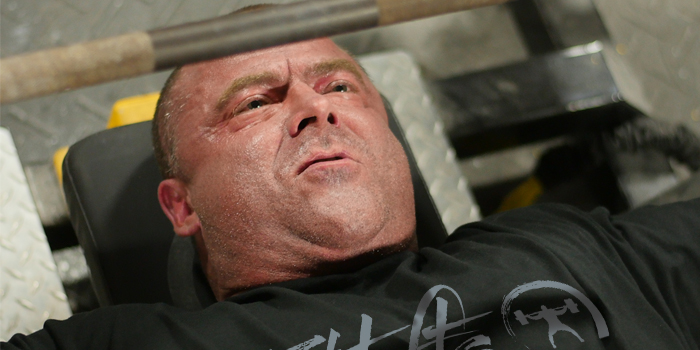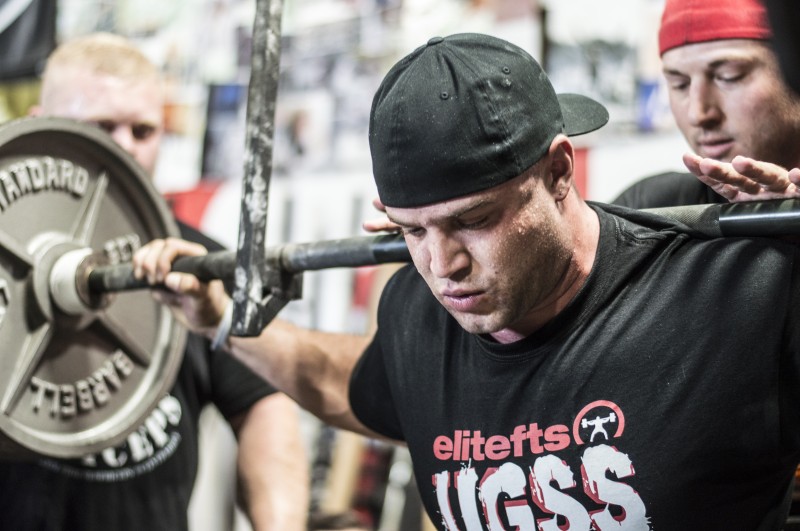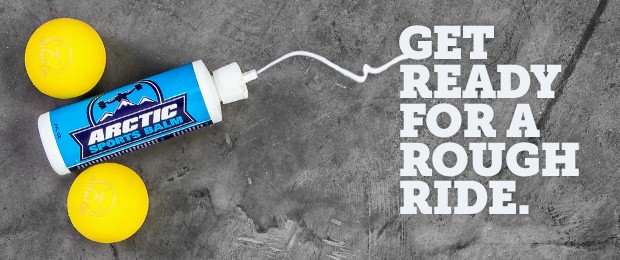
Powerlifting and training heavy isn’t a cakewalk. I’m not talking about someone who decides to try one powerlifting meet for shits and giggles and then fades into the distant past, never to return to the sport. I’m talking about powerlifters who train hard, grind, compete hard, progress, and repeat.
Whether you lift raw or in gear, powerlifters suffer a ton setbacks. I’ll bet money that anyone that you speak with who powerlifts never competes 100% healthy. There are always injuries, sore muscles, pulls, strains, tears, ruptures, ligament and tendon issues, bruising, mental barriers, and self-doubt, amongst many others challenges.
WATCH: Jim Wendler Speaks at Open Underground Strength Session
I’m starting to realize as I get older (don’t worry, you will get older someday, too) that I really have to put a LOT more emphasis on pre-habilitation, rehabilitation, rest, and recovery in order to continue to lift heavy and progress. When you’re young and bulletproof, all you care about is lifting more. Even if you suffer an injury or have some setbacks, the majority of young lifters really pay minimal attention to rest, recovery, and injury prevention. If you don’t pay attention now, you will come to a point during your lifting career where you must pay attention if you want to continue lifting.
What are some of the things that you can do to extend your lifting and help prevent injuries?
1. Listen to your body.
Lately, my body has a lot to say. Mostly it complains about something! Whether you’re smart enough to listen to it or not is up to you. How many people do you know who get injured doing their last set of squats or deadlifts when right before their last set they told you they felt like shit and their [fill in the blank] was fried or hurt like hell but they wanted to finish their set anyway? Lots.
Those injuries are totally preventable. I’d like to think I’ve started to train a lot smarter. If I feel fatigued or my back is acting up or something doesn’t feel quite right, I’m either finished for the day or I’ll do some accessory work that doesn’t affect the issue. I’d like to believe that stopping a particular movement when you’re body isn’t up to the task is the proper decision to make if I want to continue my training in the immediate future. Pushing too hard when you’re not physically or mentally ready is just asking for injury and could set your training back a few weeks.
2. Be flexible.
If you have the same weekly schedule it’s fairly easy to follow a training template. The only time it may have to change a little is if you get sick or injured or have an unexpected commitment. If you work shift work or irregular shifts, it’s pretty much next to impossible to follow a template to a T. My work schedule changes every week and I work 24-hour shifts. It’s pretty much impossible to follow anything to a T.
I am constantly adjusting my weekly training to get it done and follow it as closely as possible but it is never perfect. Some days I’ve planned my training and I’ve had a busy shift without sleep and I forego that training session for a day or two. I don’t sweat it. You have to allow some flexibility in your training or you will go nuts! You don’t have to be a perfectionist but do the best you can. You’ll still progress even if you’re training template isn’t exactly perfect.
3. Find a good doctor.
I can’t stress enough how important it is to find somebody that you can go to on a regular basis to keep your body functioning optimally. I have a great doctor, Ken Kinakin who treats me on a regular basis with a variety of treatments to keep everything functioning properly. Dr. Kinakin starts every session with muscle testing to ascertain which muscles are firing properly and which ones aren’t.
It’s never the same. I’ve had abdominal muscles, QL muscles, and lat muscles not fire and require an “awakening” to respond. I’m really surprised sometimes how fucked up I am when I go for a treatment. Depending on what’s required, different treatments are appropriate to fix things. Sometimes he uses acupuncture with electric impulses to stimulate specific muscles. Sometimes a chiropractic adjustment is all that’s needed; we’ve used an electronic acupuncture device called Dolphin Neurostim and a percussor, which uses vibration and sound waves to relieve tension in the muscle fascia.
MORE: Are You and Your PT Compatible?
Dr. Kinakin uses a great analogy about treating powerlifters; he compares them to Top Fuel dragsters. He says, “Every time a Top Fuel car goes down the track you have to tear apart the engine and see what’s wrong. Otherwise, if you leave it, it will blow up on the next run. It’s the same with powerlifters.”
4. Treat yourself.
Treating yourself covers a large myriad of things you can do to help you feel better and train more optimally. It can be as simple as foam rolling your back every morning and every night or stretching and mobility drills to keep you loose and limber. You can also take appropriate supplements to ensure you are healthy. The supplements I take on a daily basis are:
- Niacin, 1000 mg
- Vitamin C 10,000 mg
- Fish Oil, 3000 mg
- Multi-vitamin/mineral for adrenal health
- Psyllium Husk (fiber) in my morning shakes to keep the GI tract clean and optimal
Treating yourself also means ensuring you are eating enough and eating the right foods to help you build muscle and trudge through heavy training sessions. There are a lot of options such as pre-workout, intra-workout, and post-workout drinks including BCAA’s, glutamine, leucine, dextrose or cyclic dextrin to ensure you have energy for your training and help for your muscular recovery.
One of the biggest things that I recommend that doesn’t get enough attention is rest and sleep. If you're tired and you are too stubborn to take a day or two off training, your training will suck. How many times do you find yourself coming back to training after some unexpected time off and had one of the best training sessions ever? It’s not a coincidence that you have more strength, feel fresh, and can lift more when your body is rested and recharged. Rest and sleep are on the top of the list for looking after yourself to make your training optimal.
The take-home message is: Training to compete in powerlifting is hard on you both physically and mentally. If all you think you need to do is push through every workout regardless of how you feel, you will get injured, you’ll suffer many setbacks, and your training will suffer. If you take a pro-active approach to training by making it a priority to look after yourself, you should listen to your body and make the appropriate adjustments.
If your body tells you “I need a session or two off” or “I’m exhausted from not getting any sleep and working all night and if you make me do this last heavy squat session, I’m going to break” you can either choose to listen or push forward. I highly recommend listening to your body and using common sense judgment.












Thanks for the info I will put it to good use!